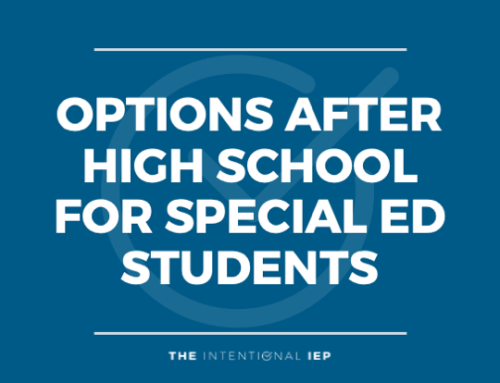Parents with unreasonable expectations IEPs can be a challenge to deal with. They may feel that their child deserves more than your school is willing to offer, and they are not satisfied when it comes time for you to provide them the truth about what you can do.
How to Handle Parents with Unreasonable IEP Expectations
Step 1 – Acknowledge
The first step in handling this situation is acknowledging that the parent may have a legitimate concern. While you may know the child well at school, parents know their child best and can see patterns over time that teachers may not be able to see or may not have noticed.
Step 2 – Ask Questions
Asking questions, and more specifically clarifying questions, before making a decision. You can also offer an opinion that may help prevent disagreements from happening.
Step 3 – Be Understanding While Explaining Your Position
Be understanding and supportive of their feelings while also explaining your position on what you can do for them in this situation. If you have any data that supports the decision, this is your time to use it and bring it in to the conversation.
While you want to help the student and provide families with what they want and need, sometimes your hands are tied and you cannot give them everything they’re asking for.
Step 4 – Offer a Compromise If You Can’t Meet Their Request
If you cannot meet the request, offer a compromise. If the parents want more accommodations for their child, then it’s best to politely decline and help them find another resource that will be able to give them what they need.
Again – data will be your best friend here in making and navigating these decisions.
Step 5 – Table the Discussion

Step 6 – Document Everything
Make sure to keep notes on how any conversations go, including dates and names of people involved, as well as who was in attendance when decisions were made about the child’s education plan.
Having the Tough Conversations
As a teacher, it can be overwhelming and difficult to collaborate with parents who have what may seem to be “unrealistic expectations” of what their child needs in order to be successful at school. These situations can be tricky because you need to balance your position as an educator and advocate, while also being supportive and understanding of the family’s perspective. It’s important to keep a level head and be understanding of the parent’s perspective while also not shying away from your responsibilities as an educator.
Veteran tip: Take nothing personal. If a parent is upset about something, the majority of the time it is because of the school’s positioning and not you as the teacher. Don’t take it personal, as difficult as it may be.
While you may feel frustrated at times, it’s best to stay calm in these situations. If parents aren’t satisfied with your explanation, it’s may be best to leave the conversation or call admin in to help and advise.
Veteran tip: A lot of the time, a teacher’s hands are tied because of the fine line we walk when advocating for a student’s needs while also being employed by the school district. So if you and the parent are on the same team, you can explain that the family may want to contact an IEP coach or advocate who specializes in these issues.
Remembering to document everything from conversations will help you later when it comes time to make decisions on what is most appropriate for the student. Don’t forget to keep notes of what you discussed, when, and with whom. By documenting the conversation from start to finish, it will make things easier later on in terms of knowing who agreed or disagreed with a certain course of action.
Veteran tip: This is also great advice for having conversations with admin at school when you are advocating for the most appropriate services and supports for your students. Admin may not always agree, so it’s important to keep your own data and ledger.
It’s important for teachers and parents to work together as partners so that children can succeed in school and reach their full potential. After all, IEPs are built to help a child in furthering their education, employment, and independent living.
Here is a short snippet from one of the trainings inside of TII membership about communicating with parents:
The membership also provides guidance on keeping parents involved, which can be challenging for everyone!
By joining the membership, individuals also gain access to an extensive library of over 13,000 pre-written IEP goals, empowering them with a wealth of options to support their students’ unique needs.
Learn more and become a member of The Intentional IEP today!
Communication is key in these situations, so it’s important to be understanding of one another while also being clear about what your responsibilities are as an educator. By following the six steps outlined in this blog post, you can better prepare yourself for any conversation with parents who have unrealistic expectations.





